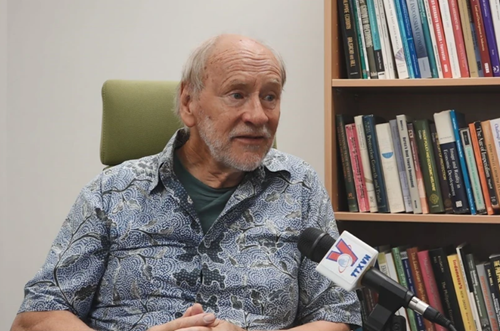In a recent interview with the Vietnam News Agency (VNA)'s resident correspondents in Sydney, Hill underscored that the S-shaped country is the most dynamic economy in Southeast Asia in this century, particularly over the past 25 years, pointing to its seamless integration into global manufacturing networks.
As manufacturing is happing everywhere and across borders, Vietnam’s achievements in industries like electronics and automobile has set it apart as the most successful country among those engaged in the global chains, he underscored.
    |
 |
|
Emeritus Professor Hal Hill at Crawford School of Public Policy, Australian National University |
He went on to say that the country’s geographical proximity to China also amplifies its significance, stating how Vietnam manages its relationship with its northern neighbor is going to be really important for the rest of ASEAN.
Shifting to the broader regional landscape, Hill described ASEAN as the most dynamic and significant region in the developing world, with a population approaching 700 million. Against this backdrop, the ASEAN Summit 2025 holds significance not only for its member states but also for the international community.
He described the meeting as one of the most important in the bloc's 58-year history since it is taking place amidst unprecedented global turbulence that directly impacts ASEAN and the wider world.
The academic expected the summit to focus on key issues such as navigating an increasingly volatile world, addressing the Myanmar crisis, mitigating trade and tariff disruptions, adapting to shifts in the global economic architecture, and peacefully solving the East Sea issue. These matters are especially urgent, Hill said, given that ASEAN economies are open and heavily trade-dependent and globally integrated.
To handle these challenges, Hill held that it is necessary for the bloc to uphold its solidarity while avoiding unilateral actions. He positioned the bloc as a central pillar within a broader regional frameworks, pointing to initiatives like ASEAN+1 partnerships and the Regional Comprehensive Economic Partnership (RCEP) which includes ASEAN along with China, Japan, the Republic of Korea, Australia, and New Zealand as examples of the organization’s expanding influence.
Several ASEAN members have also joined the Comprehensive and Progressive Agreement for Trans-Pacific Partnership (CPTPP) alongside regional partners such as Japan, Australia, and New Zealand, providing another avenue for extending the bloc's operational reach.
In the context of intensifying competition between powers, Hill suggested ASEAN preserve its neutral position, elaborating this approach will ultimately serve the organization's best interests.
Commenting on ASEAN - Australia relations, he said both sides have enjoyed friendly and sound ties while identifying substantial untapped potential for expanded cooperation, particularly in the domains of economy and education. He called for greater ambition and more support actions from both Australian and ASEAN governments to fully realize this partnership's possibilities.
Source: VNA